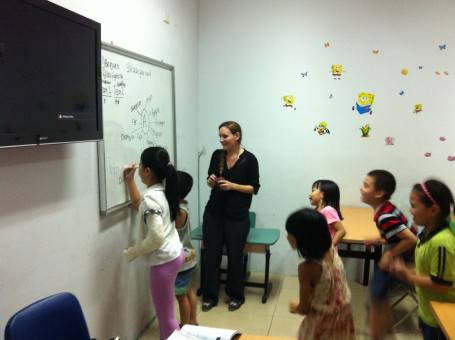When we decided to teach English in Asia we had a lot of decisions to make. Which country did we want to live in? How easily could we find a job? How much money would we make? What qualifications and experience did we need? We wanted to choose a country we felt we’d enjoy living in but with our travel fund running low we also had to consider where we could earn the most money and take into account visa issues.
After much research, we decided that Hanoi in Vietnam was the perfect place for us to live and teach. If you want to follow in our footsteps, here’s the information you need about how to find a job in Vietnam, how much you can earn and how to sort out your visas and work permit.
How Easy is it to get a Job in Vietnam?
There’s a huge demand for English teachers here in Vietnam. Parents in particular are keen for their children to learn English at school and will pay for private tuition or extra classes at a language centre if they can afford it. I’ve been approached by teachers at the schools I work in to take on private tutoring or teach at Vietnamese-run language schools.
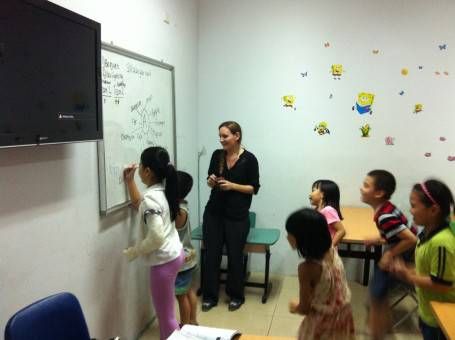
We’ve found that adults are also keen to learn English; I’ve met University students who are working as teaching assistants to improve their language skills and some of the waitresses in our favourite cafes and restaurants love chatting to us to practice their English.
Although English teaching jobs can be found throughout Vietnam, most work is available in Hanoi and Ho Chi Minh City (Sai;n). After travelling around the country for a month last year we decided to look for jobs in Hanoi because we preferred the cooler climate and liked the smaller, European feel of the city.
How we Found a Teaching Job in Hanoi
Andrew emailed a few language schools over the summer while we were in England asking for work. He had a Skype interview with Washington Language Centre who then offered us both jobs on the strength of Andrew’s interview and my CV alone. Nevertheless, we didn’t formally accept the job offers until we arrived in Vietnam so that we could check out the language centre for ourselves, meet the staff and read through the contracts in person.

Although we liked the security of having a job lined up before we arrived in Hanoi, it’s perfectly possibly to turn up, get settled and then canvas the different language centres for work. From our experience, if you’re a native English speaker with a degree and better still teaching experience (like Andrew) or a TEFL certificate (like Amy) you can pick up work in Vietnam very easily.
How much Money can you make Teaching English in Vietnam?
Rates vary depending on who you work for. Since he has previous teaching experience, Andrew was offered a starting salary of $22 per hour after tax, while I was offered $21; once we’d completed our first month’s work our pay went up by a dollar each.  We are paid monthly in a combination of US Dollars and Vietnamese Dong which we then deposit into the new bank accounts we opened in Hanoi.
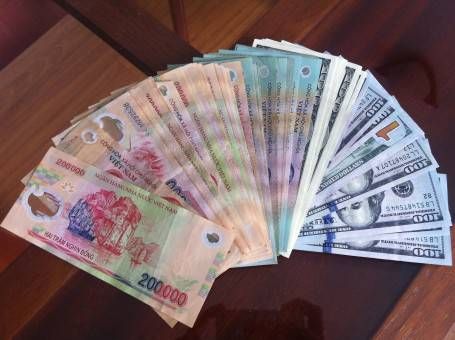
Where can you Teach?
Language centres  – there are a lot of these in Hanoi, we work for Washington but Language Link and Apollo are other well-known options. The children who have lessons at our language centre tend to be from primary and middle schools.
Public schools – the language centre we work for runs partnership programmes with public schools in Hanoi where classes are shared between Vietnamese and foreign teachers. You can teach children aged five to ten in primary schools, 11 to 14 in middle schools and up to 18 in high schools.
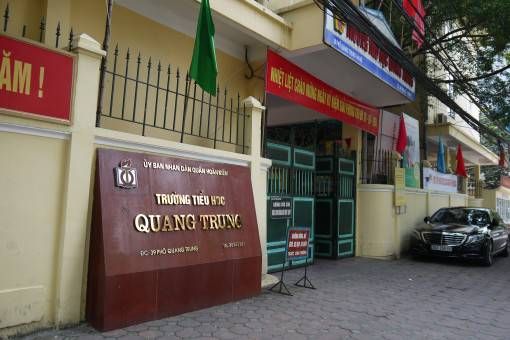
International schools – these private schools cater for foreign children and follow different curriculums; for example, a British international school would follow a British curriculum. International schools usually prefer to hire experienced teachers and pay higher salaries.
Teaching Hours and Schedules
We generally work 21 hours a week each teaching a combination of public school and language centre classes. Although this doesn’t sound much, since teaching hours are spread out we actually work Monday to Friday every morning and afternoon as well as two evenings a week.
Public schools – school terms run from September till the end of May with a two-week break for Tet in January or February. The day starts at 8.00am and there are four 35 minute classes with a short break in the middle. Lunch runs from 11am till 2.00pm and during this time we ; home to eat and rest while most kids stay at school and nap in their classrooms. There are four classes in the afternoons from 2.00pm till 5.00pm.
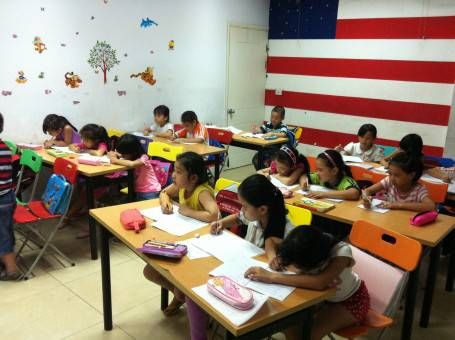
Language centres – if you teach in a language centre you’ll have to work evenings and weekends. Our centre runs 90-minute classes at 5.30pm and 7.00pm during the week and throughout the day at weekends. We teach a couple of evening classes each per week to make some extra money.
Visas and Work Permits for Vietnam
In order to enter Vietnam you need to either get a visa from a Vietnamese Embassy in advance or buy a visa approval letter online issued by the Vietnam Immigration Department. This letter will allow you to purchase a Visa on Arrival (VOA) at certain airports: Hanoi, Cam Ranh, Phu Quoc, Ho Chi Minh City or Danang.
There are many websites offering online visa approval letters but not all are legitimate. Before we left the UK we obtained our letter from Vietnam Visa Pro and we had no problem getting our VOA at Hanoi airport. Vietnam Visa Pro offer single or multiple entry and one or three month VOA letters. We opted for the three month single entry business visa letter which cost $22 each. We had to pay an additional $45 each at the airport for our visas, so the total cost for both of our three-month visas came to $134.
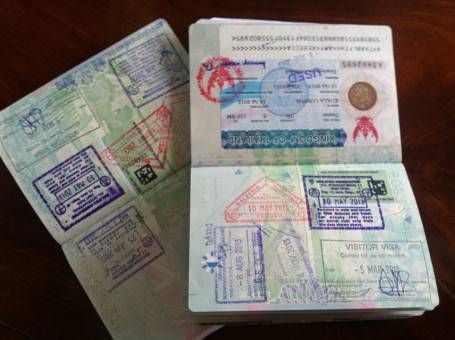
So what happens after three months? Many teachers opt to leave the country and re-enter to top-up their visas. If you sign a nine or 12-month contract with an international school or language centre they will apply for a work permit and visa on your behalf. This is a ;od option since the process of getting one is difficult, expensive and long winded. Our language centre arranged the following appointments for us:
- A two-hour health check at a local hospital where they tested everything from our blood and urine to our eyes, ears and teeth and even took a chest X-ray. This would have been extremely difficult to organise on our own.
- A Vietnamese police check. Someone from the language centre took us to Hanoi’s main police station and filled-in the paperwork for us.
In addition to this we had to visit the British Embassy in Hanoi to get the following:
- Certified copies of our most recent degree certificates.
- An affidavit proclaiming that Andrew’s UK police check is the original.
- An affidavit proclaiming that Amy’s UK police check and TEFL certificate are the originals.
The embassy documents alone cost £280 to administer and we’re not certain how much the health checks and Vietnamese police checks cost; we do know that each work permit costs about £500. Since the language centre are paying for all of this we’ve definitely saved a lot of money and hassle. All we will have to pay for are our work Visas which are about £120 each.
Source: http://www.ourbigfattraveladventure.com


